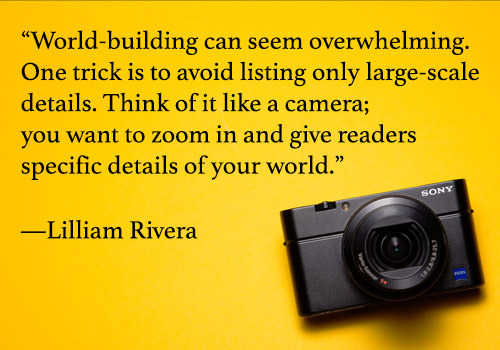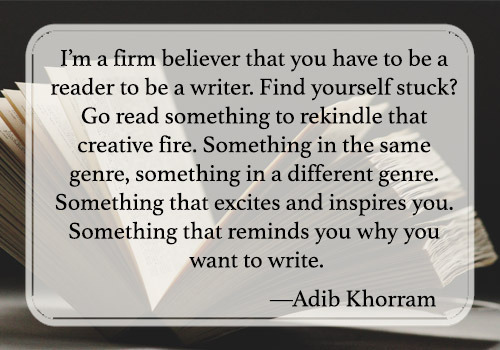Chris Baty's Blog, page 81
April 23, 2019
"‘The first draft is just you telling yourself the story.’
—Terry Pratchett
These are..."
—Terry Pratchett
These are the words I remind myself of when I feel like a draft has lost all aim and focus. A final project needs to be tight and trim; the initial draft can be loose and gloriously messy.
Give yourself permission to explore, even if it may not serve your eventual end goal. Drafting is the time to wander the world. You might info-dump, you might create an irrelevant tangent, you might create contradictory scenes. That’s all okay! The process is important in its own right.”
-

Cass Morris works as a writer and educator in central Virginia, and she occasionally moonlights as a bookseller in the Outer Banks of North Carolina. She completed her Master of Letters at Mary Baldwin University in 2010, and she earned her undergraduate degree, a BA in English with a minor in history, from the College of William and Mary in 2007. She reads voraciously, wears corsets voluntarily, and will beat you at MarioKart. Her debut novel, From Unseen Fire: Book One of the Aven Cycle, is a Roman-flavored historical fantasy released by DAW Books. Follow @CassRMorris on Twitter.
Your Camp Care Package is brought to you by Camp NaNoWriMo. Sign up to receive more Camp Care Packages at campnanowrimo.org.
April 22, 2019
3 Tips to Build a Strong Writing Practice

Camp NaNoWriMo is in full swing! Today, NaNoWriMo participant Chelsea Brickner offers some useful tips for creating and maintaining a steady writing practice to support you on your journey to meet your writing goals this month:
It was a long winter all across the board and now that the sun is emerging I feel those buds of inspiration creeping through the cracks. So if you have been feeling this way, believe me you are not alone!
Camp NaNoWriMo is wonderful! The freedom to set your own goal is one of the biggest draws for me. 50,000 words is a fire-breathing dragon guarding your treasure trove at the best of times, so embrace the chance to achieve what you want! No one knows you better than you, so set a realistic goal.
You might be asking, HOW? Getting yourself to sit down at your respective desk can be daunting, but it is the most important part. Face your dragon! Your writing habits will shape what kind of writer you are. (In my opinion, at least.) If all you tell yourself is—“someday”—it won’t happen. The day is now!
1. Pick a time.When are you feeling the most productive in your day? Crack of dawn, lunch break, the witching hour? Try to make that same time yours every single day. This is harder said than done, but if you can make it work you will find sanctuary in that time you set aside each day. Parenting, work, life. There is time. Even if you have to keep a notebook with you at all times and can only steal precious minutes to scrawl out epiphanies, it counts.
2. Pick a place.I usually write while sitting on my couch. Comfort is a big part of being able to write for me. Find that quiet center for yourself. Plant a flag and tend to your army of words, whether at a home office or a library or your local coffee shop. Gather your materials that make you feel organized and prepared. Do you have a thinking cap or favorite sweatshirt that puts you in the mood? Bring it with you! Inhabit that space. Spread out. Grow roots for as long as you need to hit that fixed mark. Having a set place where you can gather all of your creative thoughts will do wonders for getting yourself in the right mood to write.
3. Pick a goal.NaNoWriMo is fantastic because you have an entire month to splatter your heart onto that page, but you can also think smaller. Create daily goals. If competition drives you then set up timed word sprints against a friend or cabin mate to see how many words you can hammer out. I tried out word milestones to award myself with treats last November. If I hit 1,000 words I awarded myself a movie or favorite candy, and that was awesome motivation. Find what drives you and capitalize on that to soar among those stars.
My best advice to those participants old and new is to just go for it! Even if you only get down 100 words, it is 100 more words than you started with! Spring is the time for new beginnings, but it also a very busy time for people. Make time for what you are comfortable with. There is absolutely no pressure to complete, well, anything really. Channel any fears or doubts or insecurities into your work and you might amaze yourself with what comes out on the other side.
Only you can write your story.

Chelsea Brickner is a cat mom, a fiction writer, a bookstagramer, and a crazy Wrimo! Chelsea lives in the glorious PNW and works as a News Production Technician. Follow her on Instagram: @blonde_bibliophile15.
Top photo by Eye for Ebony on Unsplash.
April 19, 2019
Camp Pep: 3 Tips to Regain Inspiration

We’re almost two-thirds of the way through Camp NaNoWriMo this April! Today, Municipal Liaison for the Asia :: Cambodia region Devona Jackson shares some writing insight about where to find inspiration and how to stay inspired throughout the creative process:
Envision with me the busy life of Phnom Penh: Noisy traffic, unique smells of durian dancing in the air, piles of trash everywhere, the blast of heat causing Westerners to glisten or gush buckets from their pores. This is where I call home, despite the chaos. It it where the birth of my inspiration—my second love, writing—came to be.
As a professional curriculum consultant in Cambodia, writing is something that I do all day long. I love to create words on a page, and help people better use them for the greater good. It is all about expression. But there are times when I hit writer’s block. I am on a roll when it comes to writing an amazing blog post, a curriculum piece, or even a story. Then all of a sudden, I am stopped in my tracks and hit a brick wall. I think to myself, “What’s next?”
How do you overcome a stumbling block when all your creative juices have dried up completely? Here are three things that I do to help me overcome writer’s block:
1. Read someone else’s work.I love to read when I am not writing. One fellow NaNo writer, Jessica Ostler, an ML from the Minnesota :: Elsewhere region, sent me some of her short stories that she was working on, and it not only helped freshen my mind, but also helped me rejuvenate the creative juices that had been depleted. A shout out to her for being AWESOME!
2. Exercise another creative skill.I may not be an artist, but sometimes drawing something helps bring back some of the creative juices that I may be lacking. I have a sketch notebook, and I tend to find a place I have never been to in the city of Phnom Penh. I just sit there and draw to find inspiration. I have been inspired by drawing the Independence Monument, just focusing on the beauty of the architecture that is around me. Monuments are great places for me to gain additional inspiration.
3. Make a soundtrack for your novel.One last thing that has worked for me, is that I will put on my fiancé’s classical piano music (or any type of music you enjoy) and just free write. I can listen to him play for hours and it has inspired me to soak it in and imagine what I could add to my story, if I were creating a soundtrack to go with it. It really has helped energize me when I am stuck.
No matter where you are at in the writing process, everyone from time to time gets stuck and needs some extra help. It’s okay. Keep pushing forward. It’s better to write a few words rather than not write at all. So with that said, “Keep on Keeping on. Write big, or go home.”

Dr. Devona Jackson is the Municipal Liaison for the Asia :: Cambodia region and has lived in Cambodia for four and half years; stationed in Phnom Penh, she started NaNoWriMo in 2017 but begin serving as an ML in 2018. In 2016, she graduated with her PhD in Education Policy and Leadership from the University of Minnesota. By profession, she is a curriculum and education consultant for Cambodia Job Foundation, helping other Cambodians gain a greater appreciation for knowledge and self-reliance. Recently engaged November 7th, she is currently in the process of planning a wedding and writing.
April 18, 2019
“World-building can seem overwhelming. One trick is to avoid...

“World-building can seem overwhelming. One trick is to avoid listing only large-scale details. Think of it like a camera; you want to zoom in and give readers specific details of your world.”
—Lilliam Rivera is an award-winning writer and author of the young adult novels Dealing in Dreams and The Education of Margot Sanchez, both from Simon & Schuster and available now in bookstores everywhere. Her work has appeared in Elle, Los Angeles Times, Tin House, and The Magazine of Fantasy & Science Fiction, to name a few. Lilliam lives in Los Angeles. Follow @lilliamr on Twitter.
Your Camp Care Package is brought to you by Camp NaNoWriMo. Sign up to receive more Camp Care Packages at campnanowrimo.org.
Text added over original image by Malte Wingen on Unsplash.
April 17, 2019
Finding and Sustaining Inspiration with Dabble

Every year, we’re lucky to have great sponsors for our nonprofit events. There are lots of options when it comes to writing software, but it’s important to find the one that works best for you. Today, writer Astra Compton is here to tell you about Dabble, a Camp NaNoWriMo 2019 sponsor:
One of a writer’s eternal struggles is finding the time to write. As someone working three jobs, it’s not about squeezing more hours out of the day; it’s about making the act of writing easier. After all, when progress comes easy, everything standing in your way disappears.
You know those excuses: falling down internet-search rabbit holes, needing your writing cave to be perfect before you can even start, lacking time as you scramble between work and home, typesetting your manuscript more than you’re writing it, etc.
When I won NaNoWriMo a couple years ago, one of the prizes was a subscription to Dabble. Honestly, it has revolutionized the way I write.
I hadn’t used cloud-based systems before because I found them clunky, and invariably I’d save over the wrong version. Dabble synced to cloud storage but was streamlined. While I was writing, the interface disappeared so it was just me and my story. There was a light or dark mode (light for me), bold and italics, and word count goals. No other distractions.
In previous years, I’d write offline in documents that I would have to slingshot between Microsoft Word and LibreOffice depending on which computer I had access to. I’d write through midnight, and the previous day’s worth of writing wouldn’t log because I’d forgotten to update my count on the NaNo site. Dabble updated my word count for me, and I discovered that my anxiety about performing dissipated. All of my focus could settle on writing. I’d be deep in a sprint and a little note would pop up: “Congrats! You hit your daily goal!”
If you, like me, are motivated by checklists or self-competition, this was the steady and gentle encouragement I needed.It was only after I finished NaNo having written 85k (a personal best that I topped the following year) that I stopped to look at what this software could do. Dabble set up the book by parts, chapters, and scenes. I kept track of character POV changes by naming the scenes accordingly—which inadvertently highlighted when a character had been absent too long. When exporting to Word, the scene breaks were automatically formatted—and so were the paragraphs. This streamlined sending out to my Critique Partners, instead of the old scroll-for-pages to copy out a single chapter from my manuscripts.
I could write on my lunch break just by logging in (no more lugging around a hefty laptop), and continue writing when I got home without fumbling between back-ups and thumbdrives. I could even write offline, and the new content would sync as soon as I connected to the internet. For those easily distracted by Google or Twitter, this could prevent those while-away hours.
Preparing for my next NaNo project, I found I could build my entire outline in Dabble. The notes section doesn’t affect word count, so I’ve copied in character profiles, worldbuilding notes, lexicons and style guides—even my synopsis and query for when I’m ready to pitch. There’s also a plotting tool that allows you to set up multiple plot-lines (you can assign them however you want: by character arc, subplots, timelines, etc.), and then line them up by what happens in each chapter. For a hybrid panster-plotter like me, this organic flexibility helps me to reassess my initial skeleton as I’m writing. I can take into account how changes in pacing will affect the timing of other major plot points.
When revising, the little word counter in the corner tells me how much I’ve managed to cut; when working towards a new goal, it tells me how much I’ve got left to go. I’m easily able to toggle to ensure my chapter lengths are consistent, and make notes in the title cards if there’s anything I need to remember for revisions later.
As I worked through my rewrite, Dabble’s subtle tools cut my required drafts by half. I’m able to see more holistically from the outset, replacing a gamut of organization spreadsheets. Everything links so intuitively that I don’t waste hours with set-up, like I had previously tried (and failed) to do with Scrivener. Now I’m writing books all year ‘round. I just toggle between which project I’m inspired to work on, and it’s all helpfully in one place.
So, here I am, prepping my next novel for NaNo, waiting on feedback on the second draft of the book I wrote last November, and revising an older manuscript between projects. What used to take me 2 to 4 years is now being chipped away in months. When writing is this accessible, I can finally get out of my own way and just write.
Astra Crompton is a queer writer focusing on diverse casts with nuanced character development, bringing her passion to Adult and YA fantasy, and LGBT literature. Her work has been published in Anthology for a Green Planet, Blood Moon Rising, and Unity RPG. You can find her on Twitter @ulzaorith or on her website at www.astracrompton.com
Top photo by Amanda Jones on Unsplash.
April 16, 2019
"Don’t compare yourself to other writers or to their word counts. Your process is your own and no one..."
-

Lilliam Rivera is an award-winning writer and author of the young adult novels Dealing in Dreams and The Education of Margot Sanchez, both from Simon & Schuster and available now in bookstores everywhere. Her work has appeared in Elle, Los Angeles Times, Tin House, and The Magazine of Fantasy & Science Fiction, to name a few. Lilliam lives in Los Angeles. Follow @lilliamr on Twitter.
Your Camp Care Package is brought to you by Camp NaNoWriMo. Sign up to receive more Camp Care Packages at campnanowrimo.org.
April 15, 2019
3 Easy Tips for Creating Strong Characters

We’re halfway through Camp NaNoWriMo! Today, NaNoWriMo participant Abigail Falanga shares some powerful insight into character building and how those characters inform the structure of your story:
Characters are story.
They reveal unexpected themes, tug in new directions, propel plot-arcs, and create dialogue through opposing positions. They texture scene and setting, making your written world seem real. They draw you in and make you care. The key to creating strong characters is observation.
1. Observe Real PeoplePeople-watching is helpful (and fun!)
I mean taking note of how people act, think, talk, react, even look and smell. Then, recombine details and see what happens. Every detail makes a whole, distinct personality.
Accents and regionalisms tell where a guy is from, about a woman’s friends, about books and music they like. This hints at their taste in food, and sometimes if they’ll go in for a hug. It also sets up certain stereotypes: down-to-business woman from NYC, laid-back dude from SoCal. Then it’s interesting to watch how they meet or defy these expectations.
Quirks and idiosyncrasies are both irritating and lovable, and make up who we are as individuals. So, note those who can never remember a name, or zone out when you’re talking to them, or habits like cracking knuckles.
Sometimes, you even get glimpses of traits or insecurities this way. A friend detailing her party three times may feel you aren’t paying attention to what’s important to her. The girl always checking her phone may have difficulty maintaining eye contact.
Appearance is influenced by peer groups as much as personal taste, but also regional and occupational fashions, pop-culture, and sometimes deliberate artistic choices. A sudden change might indicate a new relationship or job. Also, since appearances are deceptive, note the contradictions between someone’s outside and their story.
Contradictions are the best! If someone looks one way and behaves another, it tells so much about them. That funny guy with a sarcastic comeback for everything might be hiding anger or powerlessness. The older lady who snaps at you in line could be the sweetest grandma in the world, just wanting to get back in time for the birthday party.
People have so many facets! Notice and remember details about strangers you encounter—and those closest to you.
2. Observe Fictional PeopleAlmost as worthwhile: Pay attention to well-written characters in favorite books, movies, and TV.
What do you love about a character? How did the author craft someone as real to you as anyone you know?
A well-loved protagonist such as Sherlock Holmes combines good traits (observational skills, scientific knowledge) with bad habits (up all night, playing loud music).
Secondary characters are just as important. Mrs. Elton in Jane Austen’s Emma is convinced she’s high society and charming, but is so full of herself that she thinks every party is for her.
Humorous or heroic, excellent authors create iconic characters using methods worth emulating: Both Mr. Holmes and Mrs. Elton, for instance, have consistent voices, good intentions, and quirks which you are likely to encounter in the real world.
3. Let Your Characters Shape Your StoryTaking a physical trait here, a contradiction and a turn of speech there, you can blend strong characters. Then comes the part I think of as: “poking them with a stick to see what happens!”
You want to know where they come from, and how did they get here? Appearance shows how they feel, and how they want the world to see them. Inconsistencies show what they want, how they’re trying to get it, and how they’re failing or succeeding.
And before you know it… your main character’s best friend is supportive, but also dealing with depression after a breakup. The kid got a black eye after the classmate he was bullying fought back.
And you have story!

Abigail Falanga is an incorrigible fantasist and inveterate science-fiction writer who believes in using long words freighted with meaning. She lives in New Mexico, alternately inspired and distracted by her family and extremely large black lab mix. A NaNoWriMo winner since 2007 and Camp NaNoWriMo participant since its beginning, Abigail is currently venturing into the thrilling, maddening world of platform-building and publishing.
April 12, 2019
Camp Pep: Your Words Have Power

We’re about to hit the two-week mark for Camp NaNoWriMo this April. How’s your project coming, writers? Today, NaNoWriMo participant D.L reminds us of the power of our words and the responsibility to choose them wisely:
Words are magical.Think about it. Twenty-six symbols. Twenty-six symbols that make up hundreds of thousands of words. Think of the feelings, the life and death that these words can bring. Think of the memories, the lives changed. Words can destroy worlds. They can build gods. They can create heroes. Words can kill. And words can save. We all know the impact of words. We’ve felt their barb and their kiss.
Often times we ignore them. They’re mundane, commonplace. Yet we also praise them. Books, stories. We seek the words of celebrities and politicians.
Think of all the power words bring. Think of the chaos that Hitler sowed. Think of the peace Gandhi brought. Words tear people apart, and words bring people together.
It’s easy to lose the words when you pull three all-nighters trying to reach your 50,000 word goal. Trust me, I’ve been there. In the early hours of the morning, trying to claw the words out of your head and piece together semi-coherent sentences. The hundreds of thousands of words are condensed to three and that one word that’s on the tip of your tongue… What was it again?
Writing becomes a chore. Often times it’s painful to push on, and the stories collect dust on the top shelf in your closet.
But when you can find the words, you remember why you write. Watching the seeds of the story grow and blossom out of the paper, ink bleeding into reality. Creations created in silence explode with an intensity you couldn’t have imagined. The waves pounding in your skull finally burst free, and your story is carried atop the crests.
“The words are yours. You have the power that they bring. I guess the real question is, what are you going to do with it?”Unfortunately, those moments are rare. Especially when you’re forcing yourself to sit down and write for a month on end. Personally, I live for those moments. The hours of head-slamming and squinting at the wall are worth the fifteen seconds of the puzzle pieces sliding into place, that satisfaction of writing something that you’re proud of.
So, at three in the morning, staying awake on an ungodly concoction of coffee and energy drinks, remember that you’re putting yourself through this for a reason. You aren’t just writing words, you’re writing your story. Your story. You created this world, these characters. You hold the strings to an intricate puppet show, and you can carry them anywhere you can imagine. The words are yours. You have the power that they bring. I guess the real question is, what are you going to do with it?
D.L. is amateur writer working on several different stories. They like Dungeons and Dragons, anime, and a large array of strange music. When they aren’t writing, they can be found at the ice rink, trying and failing to practice jumps. Podcasts and dreams are constant sources of inspiration.
Top photo by Aditya Saxena on Unsplash.
April 11, 2019
“I’m a firm believer that you have to be a reader to be a...

“I’m a firm believer that you have to be a reader to be a writer. Find yourself stuck? Go read something to rekindle that creative fire. Something in the same genre, something in a different genre. Something that excites and inspires you. Something that reminds you why you want to write.”
—Adib Khorram is the author of Darius the Great Is Not Okay. If he’s not writing (or at his day job as a graphic designer), you can probably find him trying to get his 100-yard Freestyle under a minute, learning to do a Lutz Jump, or steeping a cup of oolong. He lives in Kansas City, Missouri, where people don’t usually talk about themselves in the third person. You can find him on Twitter (@adibkhorram), Instagram (@adibkhorram), or on the web at adibkhorram.com.
Your Camp Care Package is brought to you by Camp NaNoWriMo. Sign up to receive more Camp Care Packages at campnanowrimo.org.
Text added over original image by Brandi Redd on Unsplash.
April 10, 2019
The NaNoWriMo Writing Marathon is here!

From today through Sunday, April 14, we’re running a Writing Marathon! It’s a consolidated burst of creativity—daily structured hours for whatever you’re working on (or should be working on) right now.
Help keep NaNoWriMo’s writing challenges accessible to all. Give $25 or more by April 14 to receive an exclusive “Keep Writing” patch, available only during the Marathon.

Don’t have a writing project you’re working on right now? Create your project for April here. You’ll start receiving daily writing challenges from us through April 14 in your email inbox!
Today’s challenge: Write for 10 minutes, then pass the baton to a friend. Tag a friend who should join your Writing Marathon!
Chris Baty's Blog
- Chris Baty's profile
- 63 followers



